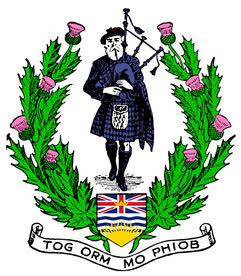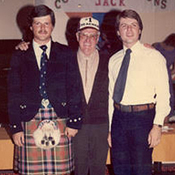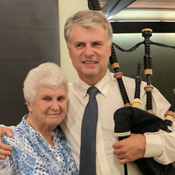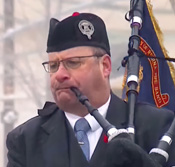Greetings and best wishes for good health in 2005. Regards, the other Ron
It was another dark and stormy night. Have the Sassenachs put a curse on the weather for Club night? Anyway, the weather inside the home of Ron & Eileen Sutherland was balmy and conducive to some excellent piping.
Once again, the December meeting was dedicated to young players with a few older pipers getting in a blow as well.
Scott Wood got the meeting off to a fine start with the ground of Corrienessan’s Salute. John Lee followed with Munro’s Salute. When I listen to this tune, a picture that comes into my mind is of the Blind Baron, Robert Munro, sitting by a fireside in his castle listening to the blind piper Iain Makay play this tune. Iain had composed the tune to honour Munro, his patron of the time.
Kyle Bantra followed with Sir James MacDonald of the Isles Lament. Sir James was of Sleat, Skye. He died in 1678. The designation, Of the Isles (na’n Eilean), was how the Gaelic people referred to him. The title was a carry-over from the days when the Chiefs of his Clan had been called Lord of the Isles. The tune is attributed to William Macdonald of Vallay.
Chris Low played Munro’s Salute, followed by Colin Lee with Lament for Mary MacLeod and Ben Parsonson with Lament for the Old Sword.
Andrew Lee played a tune not previously heard at the Club – March for a Beginner. This tune, without grace notes, is in Joseph MacDonald’s A Compleat Theory of the Scots Highland Bagpipe, 1760/1763. It is a tune blessed with several names: The Black Watch Salute, Bengal Piobaireachd, Home Memories from Bengal. Joseph MacDonald served in Bengal with the East India Company and died there shortly after joining the army.
Hal Senyk gave a fine rendition of The Old Woman’s Lullaby. This is thought to be among the oldest of the tunes. Indeed, heather myth carries the tune back in time to harpists and, perhaps, to the pagan era. Some think it was originally a tribute to a Moon Goddess. In various mythology, Moon Goddesses are depicted as easily offended and prone to quick revenge for slights and neglect. Pity the poor wretch who offends her! Better to sing her praises and offer up a song in her honour.
Tyrone Heade played another tune heard for the first time at the Club – Lament for the Little Supper. This is thought to be another very ancient tune. The event that inspired the tune involved the Comyns and Clan Mackintosh circa 1430. The Comyns invited Mackintoshes to a reconciliation banquet. Their intent was to put them to death when a black bull’s head was brought into the banquet room. The Mackintoshes were warned beforehand and carried hidden arms to the banquet. As soon as the bull’s head came into sight, they turned on the Comyns and put them to death. This action broke the power of the Comyn family and brought an end to centuries of struggle between the Comyns and Mackintoshes.
Ed McIlwaine closed the meeting with the majestic Lament for the Earl of Antrim. It is an historical oddity that MacDonalds and MacLeods of Skye were induced by a progenitor of the Earl to give up their endless feud and join with him in warfare against Queen Elizabeth. This they did and fought side by side. On returning to Skye, they promptly resumed their feud. Donald Mor fought in Ireland with MacLeod’s troop. Whether the tune was composed by Donald Mor or his son Padruig Mor remains an open question. Some say that because of the style, the probability rests with Padruig. Others hold the view that Donald was still alive when the Earl died and he composed the tune. Whatever! It is a glorious piobaireachd that well deserves to be called The Great Music.
The date of the next meeting is yet to be revealed. For whatever information that may be available,




